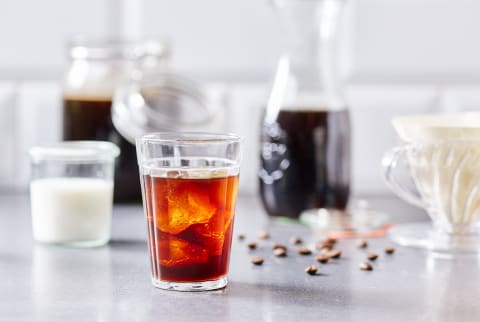Advertisement
The Best Way To Keep Your Coffee Beans Fresh For A More Flavorful Brew


No matter how you prepare your morning cup of coffee, there's one common denominator: the coffee itself. But are there ways to store your favorite coffee beans to keep them more fresh?
We spoke to Margaret Nyamumbo, a third-generation coffee farmer and the founder and CEO of Kahawa 1893, about all the best ways to store your coffee. Based in California, Kahawa 1893 works directly with female coffee farmers in Kenya.
So, what is the best way to store coffee beans?
There are three things you definitely want to avoid when it comes to storing coffee beans: "Oxygen, moisture, and light are the enemies to coffee's freshness, so you want to keep the coffee away from these elements," explains Nyamumbo.
To avoid those dangerous three, you'll ideally want to store coffee in an airtight, opaque container—from there, you can place it on your counter or in a cupboard—but not the freezer, even though you may have heard that before.
"In the freezer, condensation produces moisture that makes coffee stale, and unless the coffee is vacuum-packed, it can pick up smells from other food in the freezer," says Nyamumbo.
Whole bean versus ground coffee: What's better?
Looking for maximum freshness from your coffee? Your best bet is grinding the coffee right before brewing: "Ground coffee loses flavor so rapidly, it's basically stale by the time it gets to you," she says. "Whole bean holds the flavor longer, and you can enjoy fresh coffee for longer over time."
There are a few more good reasons to go for whole beans. First, it's more likely to be a high-quality product. "Whole bean is likely to be of higher quality, since the whole bean is visible, versus just grounds that you can't inspect directly for quality," said Nyamumbo.
Secondly, grinding your coffee at home means you can cater to your brew method, which in turn will result in a better and fresher cup of coffee. "A Chemex, French press, and V-60 Pour-Over each require different grind sizes, so whole bean gives you that flexibility to experiment and dial in," she explained.
How long does coffee last?
The question of coffee's shelf life is a bit complicated because it depends on whether you're seeking its peak flavor or just when it's still "safe" to drink. When it comes to whole bean, "to get the best out of the coffee, the first month after roasting is the most optimal time," says Nyamumbo. "After that, it deteriorates gradually, but how it's stored can affect how long it maintains freshness."
Another factor at play is the origin of the coffee because the longer you wait after roast date (which most speciality coffee brands will put on the packaging), the more flux there may be to the flavors. "I drink Kenyas, which tend to be bright—and that acidity fades over time, which is different but not necessarily bad. Some coffees age pretty well."
The real outer limit for whole bean coffee is a year—anything over that will likely have lost its distinctive characteristics. "I am not sure if there is a shelf life limit, as I have seen expiration dates at the grocery store that were two years out," Nyamumbo says.
As previously stated, ground coffee is going to lose its punch a lot faster. "Once ground, flavor loss accelerates, and coffee can lose freshness in a matter of hours, unless it's instantly preserved in an oxygen-free package," she explained.
"The science behind it is that grinding increases the surface area of the coffee and the CO2 escapes rapidly—upsetting the balance needed to produce the right aromatics." Once those aromatics are gone, you may still get a nice cup of coffee, but it won't be as full-flavored and you won't get as much of that wonderful morning coffee smell.
Is there such a thing as coffee that's "too fresh"?
Believe it or not, there is: "After roasting, the coffee needs to de-gas in order to get rid of gases that build up during roasting," shares Nyamumbo. How long that process will take actually depends on the roasting itself and the drying process used on the green coffee beans.
"The type of processing (washed versus natural) and roasting style (light versus dark) affect how long the coffee needs to de-gas; lighter roasts and naturals need a bit more time." Not only that, but how you're preparing the coffee matters, too. For drip preparations, anywhere from five to seven days after roasting is the best spot, but if you're going espresso, it'll need a bit more time.
The takeaway
The best way to store coffee may actually start at ordering: You're going to be better off ordering whole beans and grinding each serving just before you brew.
Once you've got your beans, an opaque, airtight container in a dry place is the best place to keep them, and for optimal flavor you'll want to drink it in the first month—but perhaps not the first week—after roasting.
